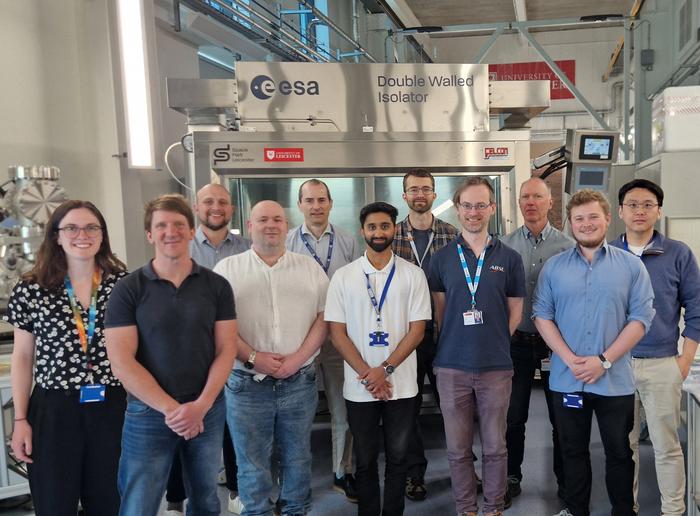In a groundbreaking development that could revolutionize the way extraterrestrial materials are handled and studied, scientists at the University of Leicester have embarked on the design and construction of a pioneering piece of laboratory technology known as the Double-Walled Isolator (DWI). This ultra-clean, miniature laboratory system is engineered with the utmost precision to safely store and analyze samples returned from Mars, ensuring the integrity and pristine condition of these priceless materials. By creating a controlled, contamination-free environment, the DWI aims to usher in a new era of planetary science, allowing researchers to examine Martian rocks with unparalleled accuracy.
The University of Leicester team recently achieved a significant milestone when they successfully passed a key review conducted by the European Space Agency (ESA). This clearance paves the way for the development of the Qualification Model of the DWI, a critical step toward realization of the Mars Sample Return (MSR) mission’s ambitious goals. The €5 million initiative is housed within Space Park Leicester, a visionary £100 million science and innovation park that fosters cutting-edge research and technological advancements. Here, multidisciplinary experts are poised to translate conceptual designs into a fully functional isolator capable of handling extraterrestrial samples under rigorous safety protocols.
At its core, the Double-Walled Isolator functions as a compact laboratory environment meticulously engineered to accommodate samples of Martian origin. Its defining characteristic lies in its double containment barrier designed to provide a high level of cleanliness and isolation. This is vital because even the slightest contamination could compromise the scientific validity of analyses meant to unlock the geochemical and astrobiological secrets hidden within Martian rocks. The architecture of the DWI minimizes direct human contact, employing advanced robotics and automated systems to handle, move, and test samples within an inert gas atmosphere.
.adsslot_spKItObCo5{ width:728px !important; height:90px !important; }
@media (max-width:1199px) { .adsslot_spKItObCo5{ width:468px !important; height:60px !important; } }
@media (max-width:767px) { .adsslot_spKItObCo5{ width:320px !important; height:50px !important; } }
ADVERTISEMENT
Robotics play a pivotal role in preserving the isolator’s sterile environment while facilitating precise analytical workflows. A state-of-the-art robotic arm is designed to manipulate samples inside the inert atmosphere—a controlled environment free from reactive gases—to avoid introducing terrestrial contaminants. Within this enclosed space, sophisticated instruments such as optical microscopes and Raman spectrometers will carry out detailed chemical and geological examinations. Raman spectroscopy, in particular, offers molecular-level insights by detecting vibrational modes of minerals, enabling researchers to characterize the mineralogical composition and identify potential biosignatures.
The DWI’s evolution builds upon previous prototypes but takes a significant leap forward in terms of sophistication and functionality. The current phase gears toward building the Qualification Model, constructed with vital input from a diverse group of esteemed partners that include the Open University, the Francis Crick Institute, Imperial College London, and the Natural History Museum. Extract Technologies, an industrial leader specializing in advanced containment solutions for pharmaceutical and nuclear applications, is the primary commercial collaborator contributing expertise in precision engineering and manufacturing of isolators meeting exacting standards.
Completion of the System Requirements Review (SRR) marked the conclusion of the initial project phase and affirmed that the comprehensive technical and operational needs have been rigorously defined. This step is critical as it lays a firm foundation for the subsequent detailed design work. According to Andrew Cheney, the DWI Qualification Model Project Manager, generating a robust, fully agreed set of requirements is one of the most challenging aspects of the development process, requiring an intricate blend of industry experience and scientific insight to align the isolator’s capabilities with mission demands.
Looking ahead, the University of Leicester team faces a demanding and compressed timeline to transition from concept to detailed design and manufacturing. The qualification phase will rigorously simulate the handling and scientific processing of Martian analogue materials to validate the isolator’s performance under realistic conditions. This end-to-end testing ensures the DWI can maintain unprecedented cleanliness levels while supporting complex analytical protocols integral for Mars sample curation and study.
Darren Hughes, Managing Director of Extract Technologies Ltd, expressed enthusiasm over his company’s selection as the manufacturing partner for this landmark project. By leveraging decades of experience in providing containment solutions demanding extreme cleanliness and safety, Extract Technologies will manufacture the isolator at their UK facility in Huddersfield. This collaboration exemplifies how the intersection of academic and industrial expertise can accelerate the translation of visionary scientific equipment from design boards to operational reality.
The Double-Walled Isolator project exemplifies the interdisciplinary efforts and innovative spirit driving the future of space sciences and planetary sample handling technologies. With the integration of cutting-edge robotics, sophisticated analytical instruments, and rigorously engineered containment systems, the DWI strives to establish a new benchmark in the curation and study of extraterrestrial material. Its development will not only bolster the scientific return of Mars Sample Return missions but will also inform the broader exploration initiatives seeking to unravel the history and habitability of other worlds.
As preparations move forward, the University of Leicester team and its collaborators remain committed to overcoming complex technical challenges integral to creating one of the most intricate laboratory environments ever constructed for planetary science. The success of the DWI will ensure that humanity’s precious Martian samples are preserved and studied under the most exacting conditions, maximizing their scientific potential and advancing our collective knowledge of the universe.
Subject of Research: Design and development of a Double-Walled Isolator for safe storage and analysis of Mars Sample Return mission materials.
Article Title: University of Leicester Leads Development of Ultra-Clean Double-Walled Isolator to Safeguard Martian Samples
Web References:
https://mediasvc.eurekalert.org/Api/v1/Multimedia/3bda59b3-4703-43fa-b54e-7f69f402d3f1/Rendition/low-res/Content/Public
Image Credits: University of Leicester
Keywords
Planetary science, Planetary surfaces, Space manufacturing, Sample handling, Chemical analysis
Tags: contamination-free laboratory environmentcutting-edge scientific innovationDouble-Walled IsolatorEuropean Space Agency collaborationextraterrestrial sample handlingMars Sample Return missionmultidisciplinary research in space explorationplanetary science advancementssafe storage of Martian rocksSpace Park Leicesterultra-clean mini-lab technologyUniversity of Leicester research





